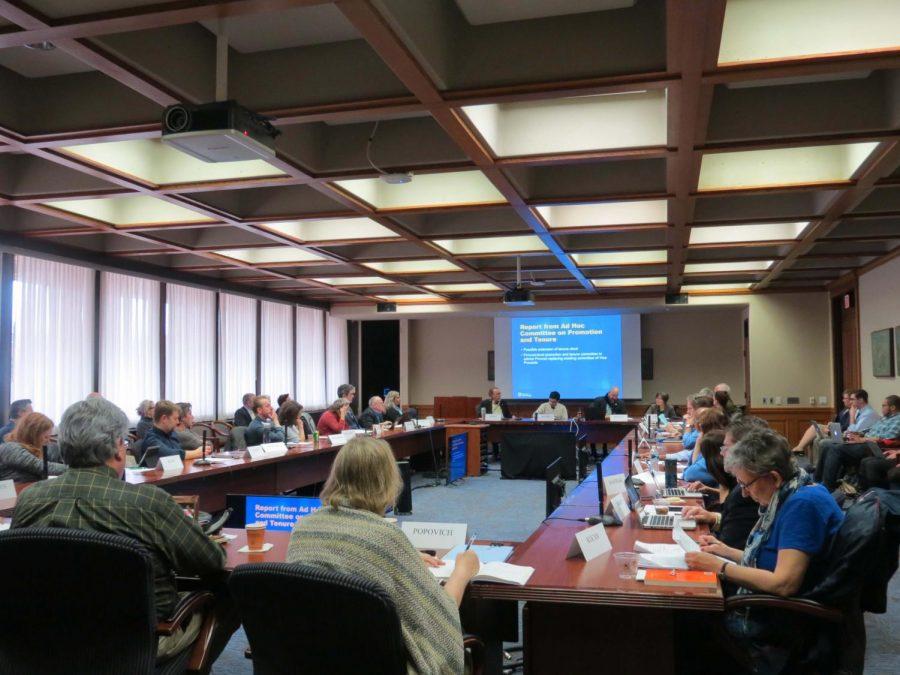Faculty assembly prepares for possible Pittsburgh pandemic
Rachhana Baliga | Staff Photographer
At Wednesday’s Faculty Assembly Meeting, Ted Fritz, the associate vice chancellor of public safety and emergency, announced the University is acting under “Response Level B: High Alert” because of the SARS-CoV-2 epidemic and discussed potential actions if cases are reported in the area.
March 5, 2020
Pitt is acting under “Response Level B: High Alert” due to increased concern over the SARS-CoV-2 epidemic, Ted Fritz, associate vice chancellor of public safety and emergency, announced at the faculty assembly meeting Wednesday afternoon.
Fritz said despite no reported cases in Pennsylvania of coronavirus or COVID-19, the respiratory illness caused by SARS-CoV-2, the spread of the disease to our will happen in “just a matter of time.” He said this is influencing the University’s response of “preparing for the worst without panicking.”
The novel coronavirus has been reported in more than 45 countries around the world and claimed the lives of more than 3,200 people, including 11 Americans, according to ABC News. Pitt’s response to the virus was the main topic of discussion at the meeting held in Posvar Hall along with updates to tenure policies for professors.
Provost Cudd announced Tuesday afternoon that Pitt had cancelled all University-sponsored spring break study abroad and study away programs that require air travel, affecting 162 students. She also expanded a mandatory recall to 27 students studying abroad in France, Germany and Spain. Last Friday, Pitt mandated 41 students in Italy, South Korea and Japan to return home “as soon as practicable.”
Belkys Torres, the executive director of global engagement for the University Center for International Studies, said students would be completely refunded for all costs associated with cancelled trips.
“Students will be fully refunded,” Torres said. “For airfare, for penalty fees, for accommodations, for tuition fees.”
Upon arrival, Pitt is asking students to practice “social distancing,” a virus containment technique where a distance of 3 feet is maintained from people who are coughing or sneezing, for 14 days as part of its pandemic preparedness plan. If cases are reported in the area, Fritz said, the University would then enter into the more urgent “Response Level C: Social Distancing” phase, where social distancing is practiced at a University-wide level rather than on an individual basis.
During this phase, Fritz said classroom instruction would be limited or cancelled and mass gatherings would be limited. Fritz referenced Stanford University’s model as a possible plan if the virus spread to the Pittsburgh area. Stanford is “highly encouraging” campus groups to cancel or postpone events with more than 150 attendees.
When asked how social distancing will be carried out for students living in residence halls, Torres referred students to the Student Health Center.
“The first thing they need to do if coming back from these [affected] locations is contact the Student Health Center,” Torres said. “The Student Health Center will give them guidance on the 14-day social distancing.”
Torres also said Pitt can’t enforce the same legal requirements toward clubs’ spring break travel, such as Medlife’s trip to Peru. She said the University can only impose social distancing practices and encourage students to register their travel in a university-wide registry so her office can provide support.
“The advice from legal counsel is that we cannot impose the same requirements on those groups,” Torres said. “We are highly encouraging them to reconsider their travel during spring break as well as laying out the social distancing protocol they will have to practice if they’re coming from high risk locations.”
Fritz said testing for COVID-19 will be much faster after the Pennsylvania Department of Health receives testing kits, despite Allegheny County Health Department not currently having these kits. He also said the Pennsylvania Department of Health conducts testing for Pitt, but if there is a suspected case at the University, the Allegheny Health Department will “help push the testing forward.”
Fritz added that the pandemic preparedness plan has existed at Pitt for about 10-12 years since it was originally created in response to the avian flu. He said it was then used again during the H1N1, SARS and Ebola outbreaks, making the University more prepared.
“Unfortunately, we have a lot of practice in preparing for epidemics or pandemics as COVID-19 is just on the merge of,” Fritz said. “In January, we started looking at it to see what had to be updated in relation to this particular threat.”
Pitt announced on Thursday that it had revised the plan, which included setting up a centralized website, emergency.pitt.edu, for reliable updates about the disease. Pitt also purchased more than 440 hand-sanitizing stations, according to Jay Frerotte, the director of environmental safety. Frerotte said these stations were a great addition to campus.
“These handwashing stations are kind of a coup because our neighbors can’t seem to get these things,” Frerotte said. “We’re pretty well stocked.”
This follows recommendations from the World Health Organization to prevent further spread of coronavirus that include regular handwashing, covering your mouth and nose when coughing and sneezing, avoiding close contact with anyone showing symptoms of respiratory illness and thoroughly cooking meat and eggs.
At the City level, the Department of Public Safety said in a press release on Thursday that it has finished updating its 2015 pandemic operational plan. This updated contingency plan included ensuring additional EMS personnel and units are available if needed, as well as inspecticing current vehicles.
Fritz said safety is his department’s focus, but that they will try to keep Pitt open, which is why planning ahead is so important.
“The safety of people is our main priority, realizing that could cause hardships in getting your job done,” Fritz said. “We also want to keep the University operating, so we encourage departments to plan.”








